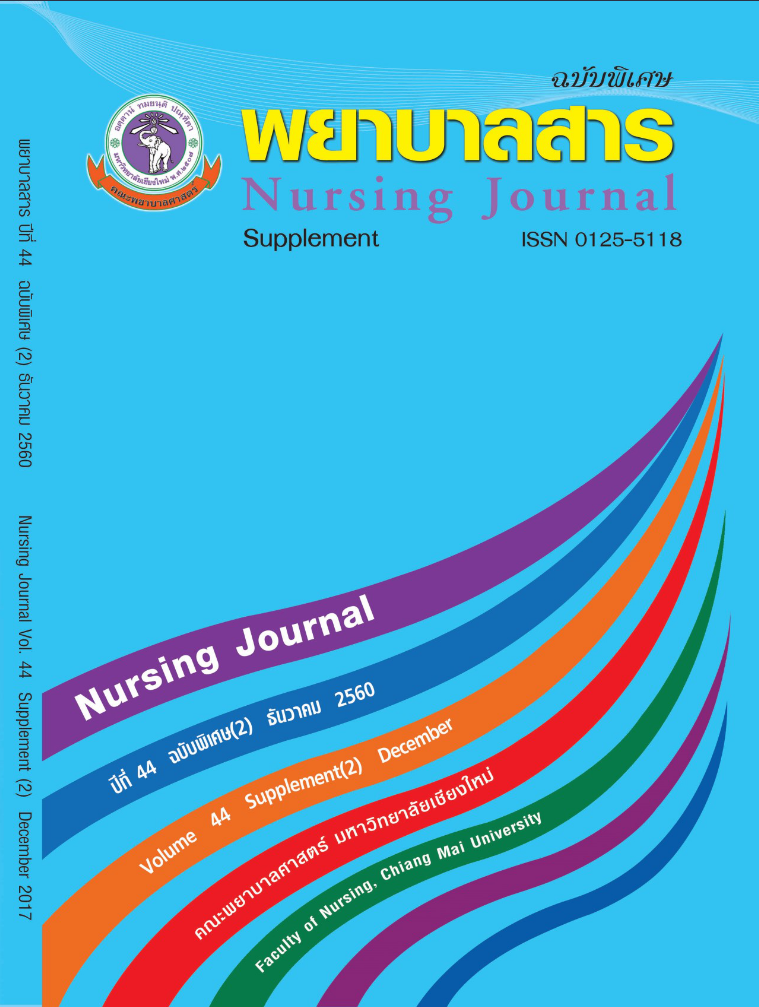The Development of Emotional Intelligence in Nursing Students
Keywords:
Emotional Intelligence, nursing studentsAbstract
Emotional Intelligence is an ability to live with others creatively and happily. Persons with Emotional Intelligence are able to perceive their own emotions and needs, as well as be compassionate, responsible, and motivated. They can also make decisions to solve problems, build good relationship with others, be virtuous and valuable persons who are satisfied with life, have peace of mind, and can lead a happy life. Moreover, emotionally intelligent persons are motivated, goal-directed, determined, as well as confident to think and make decisions. They can use their intellectual capability to the fullest extent. Emotional Intelligence is crucial to nursing students since it allows them to develop significant characteristics for their lives. There are three aspects of emotional quotient development: 1) Emotional Intelligence development for goodness enables nursing students to control their own emotions and needs, be compassionate, and responsible to others; 2) Emotional Intelligence development for competence allows nursing students to cultivate self-recognition, motivation, appropriate decision-making ability, effective performance, and good relationship with others, and 3) Emotional Intelligence development for happiness allows nursing students to live happily, be proud of themselves and satisfied with life, as well as have peace of mind. Emotional Intelligence is a quality that is of great importance for nursing students. Thus, educational institute administrators and teachers should recognize the significance of Emotional Intelligence and promote its development in nursing students so that they can be ready for society and perform their nursing role happily and successfully.
References
เทอดศักดิ์ เดชคง. (2546). ความฉลาดทางอารมณ์จากทฤษฎีสู่การปฏิบัติ (พิมพ์ครั้งที่ 2). กรุงเทพมหานคร: สำนักพิมพ์มติชน.
นะฤเนตร จุฬากาญจน์, จารุวรรณ ไผ่ตระกูล, และ สุนีย์ ละกำปั่น. (2558). การพัฒนาความฉลาดทางอารมณ์ในวัยรุ่นโดยประยุกต์หลักการคิดแบบพุทธธรรม. วารสารพยาบาลสาธารณสุข. 29(1), 132-143.
ประภาศ ปานเจี้ยง. (2558). ปัจจัยที่ส่งผลต่อความฉลาดทางอารมณ์และรูปแบบการพัฒนาความฉลาดทางอารมณ์ของนักศึกษาสถาบันอุดมศึกษาในจังหวัดสงขลา. มหาวิทยาลัยหาดใหญ่.
ปิยธิดา เลื่อนพลับ, และ ฉันทนา กล่อมจิต. (2550). การพัฒนาความฉลาดทางอารมณ์โดยใช้โปรแกรมฝึกการคิดแบบโยนิโสมนสิการของเยาวชนในศูนย์ฝึกและอบรมเด็กและเยาวชนเขต 4 จังหวัดขอนแก่น (วิทยานิพนธ์ปริญญาศึกษาศาสตรมหาบัณฑิต สาขาวิชาการแนะแนวและให้คำปรึกษา). บัณฑิตวิทยาลัย, มหาวิทยาลัยขอนแก่น.
พรจันทร์ โพธินาค. (2554). ปัจจัยที่ส่งอิทธิพลต่อผลสัมฤทธิ์ทางการเรียนของนิสิตที่มีผลการเรียนต่ำกว่าเกณฑ์ (วิทยานิพนธ์ สาขาวิชาบริหารการศึกษา). คณะศึกษาศาสตร์, มหาวิทยาลัยบูรพา.
พระธรรมปิฎก (ป.อ. ปยุตโต). (2542). พุทธศาสนากับการศึกษา. (พิมพ์ครั้งที่ 2). กรุงเทพฯ: มูลนิธิพุทธธรรม.
พระมหาสำนิ วีระศร. (2548). ผลของการใช้เทคนิคการฝึกขันติ วิธีการแผ่เมตตาและวิธีการทำสมาธิที่มีต่อความฉลาดทางอารมณ์ของนักเรียนมัธยมศึกษาตอนปลาย (วิทยานิพนธ์ปริญญาศึกษามหาบัณฑิต สาขาจิตวิทยาการศึกษา). มหาวิทยาลัยมหาสารคาม.
วลัยนารี พรมลา. (2557). ความฉลาดทางอารมณ์ ของนักศึกษาพยาบาลศาสตร์มหาวิทยาลัยเอกชน ในจังหวัดปทุมธานี. วารสารบัณฑิตศึกษา: มหาวิทยาลัยราชภัฏสวนสุนันทา. 2(2), 432-438.
วิมล เอมโอช, บุญเรือน พฤกษ์ศศิธร, และ เยาวเรศ ใจเย็น. (2556). ความฉลาดทางอารมณ์ของนักศึกษามหาวิทยาลัยราชภัฏรำไพพรรณี. วารสารสังคมศาสตร์ มหาวิทยาลัยศรีนครินทรวิโรฒ,16,185-199.
สภาการพยาบาล. (2552). สมรรถนะของพยาบาลวิชาชีพ. สืบค้นจาก www.tnmc.or.th/news/91.
สุกัญญา มีมุ่งกิจ. (2547). ผลการใช้กิจกรรมของโจฮารีวินโดว์ต่อการพัฒนาความฉลาดทางอารมณ์ของนักเรียนชั้นมัธยมศึกษาปีที่ 5 โรงเรียนดาราสมุทร (ปริญญาการศึกษามหาบัณฑิต สาขาวิชาการบริหารการศึกษา). มหาวิทยาลัยบูรพา.
สุทัศน์ สุรสหัสสานนท์. (2549). ผลของการพัฒนาความฉลาดทางอารมณ์โดยประยุกต์ใช้ทักษะชีวิตของนักเรียนมัธยมศึกษาปีที่ 1 โรงเรียนขยายโอกาสทางการศึกษา อำเภอหนองม่วง จังหวัดลพบุรี (ปริญญาสาธารณสุขศาสตรมหาบัณฑิต สาขาวิชาสุขศึกษาและการส่งเสริมสุขภาพ). บัณฑิตวิทยาลัย, มหาวิทยาลัยขอนแก่น.
สุปราณี การพึ่งตน และ วัฒนา บรรเทิงสุข. (2547). ผลการปฏิบัติวิปัสสนากรรมฐานตามแนวสติปัฏฐานสี่ ต่อเชาว์อารมณ์ของนักศึกษาพยาบาล. วิทยาลัยพยาบาลพระปกเกล้า จันทบุรี.
สุรีรัตน์ เตี๋ยอนุกูล. (2553). การศึกษาความฉลาดทางอารมณ์ของนักศึกษาพยาบาล วิทยาลัยเครือข่ายภาคกลาง 2 (วิทยานิพนธ์, สาขาวิชาการพยาบาลสุขภาพจิตและจิตเวช). มหาวิทยาลัยบูรพา.
อาจอง ชุมสาย ณ อยุธยา. (2546). การพัฒนารูปแบบการเรียนการสอนแบบบูรณาการคุณค่าของความเป็นมนุษย์โดยอิงแนวคิดการเรียนรู้จากการหยั่งรู้ด้วยตนเอง (วิทยานิพนธ์ครุศาสตรดุษฎีบัณฑิต, สาขาวิชาหลักสูตรและการสอน). บัณฑิตวิทยาลัย, จุฬาลงกรณ์มหาวิทยาลัย.
Goleman, D. (1998). Working with Emotional intelligence. New York: Bantam Book.
Markham, T. (2004). Effects of positive emotional refocusing on emotional intelligence and autonomic recovery from stress in high school students. Retrieved from http://proquest.umi.com/pqdweb.
Salovey, P., & Mayers, J. D. (1997). What is emotional intelligence? In emotional development and emotional intelligence: Implications for educators. New York: Basic Book.
Thongsom. P. (2014). The development of indicators of happiness in learning of students in Nursing Science Undergraduate Program under The Ministry of Public Health. Journal of Nursing and Education. 4(1),88-110.
Yimkhlib, S., (2006). Effect of promoting self- esteem by participatory learning process on emotional intelligence among early adolescents in Nonthaburi Province (Unpublished master’s thesis, Master of Science in Public Health). Faculty of Graduate Studies, Mahidol University, Bangkok, Thailand.
Downloads
Published
How to Cite
Issue
Section
License
บทความที่ได้รับการตีพิมพ์เป็นลิขสิทธิ์ของวารสารพยาบาลสาร
ข้อความที่ปรากฏในบทความแต่ละเรื่องในวารสารวิชาการเล่มนี้เป็นความคิดเห็นส่วนตัวของผู้เขียนแต่ละท่านไม่เกี่ยวข้องกับมหาวิทยาลัยเชียงใหม่ และคณาจารย์ท่านอื่นๆในมหาวิทยาลัยฯ แต่อย่างใด ความรับผิดชอบองค์ประกอบทั้งหมดของบทความแต่ละเรื่องเป็นของผู้เขียนแต่ละท่าน หากมีความผิดพลาดใด ๆ ผู้เขียนแต่ละท่านจะรับผิดชอบบทความของตนเองแต่ผู้เดียว






